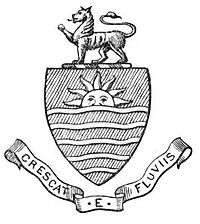Louis Dane
Sir Louis William Dane GCIE CSI (21 March 1856 – 22 February 1946) was an administrator during the time of the British Raj.[1]
Early life
He was born on 21 March 1856 at Chichester, Sussex the fifth son of Richard Martin Dane, an army staff surgeon, and Sophia Eliza, the daughter of Colonel Charles Griffiths who had served in the First Anglo-Afghan War. He was educated at Dr Stackpole's school in Kingstown, Dublin and passed his examinations for the Indian Civil Service in 1874. He was married to Edith Norman on 3 March 1882.
Civil service
In 1876 he was posted to the Punjab as assistant commissioner in Dera Ghazi Khan. In 1879 he became private secretary to Sir Robert Egerton, lieutenant-governor of the Punjab. In 1904, the Dane Mission, named for his leadership, was sent by the British to Afghanistan to negotiate the friendship agreement with the country's new Amir, Habibullah Khan. The mission resulted in a reinforcement of the agreements between the British and Abdur Rahman Khan, Habibullah's father and predecessor as Amir.[2] Afghanistan was a key player in The Great Game, and Dane's mission confirmed Britain's control over Afghanistan's foreign policy, and therefore gave the British the upper hand over the Russians. In 1908 he was appointed Lieutenant-governor in the Punjab, a post from which he retired in 1913.
Death
He died at his home in South Kensington, London, on 22 February 1946. He is buried at Southampton Old Cemetery.
References
- "Sir Louis Dane". The Times. London (50384): 6. 23 February 1946.
- Ludwig Adamec, Afghanistan, 1900-1923, A Diplomatic History.
